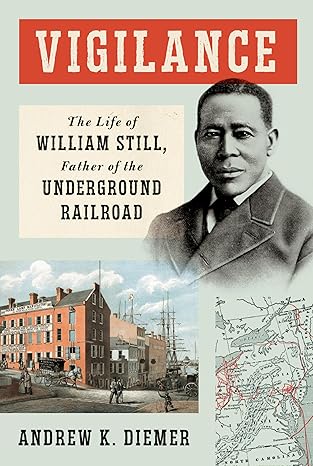The Book
Andrew K. Diemer
The Author(s)
Vigilance: The Life of William Still, Father of the Underground Railroad

Andrew K. Diemer’s Vigilance is a must-read for those interested in Underground Railroad and African American history. It highlights the dynamic story of William Still “the Father of the Underground Railroad” who helped freedom seekers from slavery in the American South move further northward via Philadelphia. Diemer carefully tells the family history of William Still, starting with the enslavement and liberation of his parents—father Sydney purchased his freedom and mother Charity escaped twice from the Eastern Shore of Maryland. They settle together in the southern New Jersey pinelands of Burlington County, now Shamong Township, and changed the family name from “Steel” to “Still” to aid in concealing their identity in the American North.
The actions of William Still’s parents to fight against enslavement foreshadowed the future work he performed as a “clerk” at the Pennsylvania Anti-Slavery Society and as the chairman of its Vigilance Committee. Between 1853 to 1861, he helped, interviewed, and meticulously recorded nearly 1,000 stories of Black runaways in some 800 pages. A number of the interviews included illustrations and personal correspondence. This foundational work titled simply The Underground Railroad was first published in 1872 narrates enslavement, the brutality of the “peculiar institution” as well as family, fleeing, and freedom. Still explained that 95 percent of the fugitive slaves he interviewed stayed at his home with his wife Letitia George Still. Letitia accommodated runaways in their home as her husband looked to place them in an ideal location in the American North, New England, Canada, or otherwise to heighten their probability to not get captured. Other period accounts of fleeing fugitives, like those of Benjamin Drew, Sydney Howard Gay, and Samuel Gridley Howe, do not have the volume of interviews Still conducted nor were they documented by a Black person.
The book chapters mend together seamlessly and are the outcome of diligent research. The chapters that will likely draw the most attention are: “The Anti-Slavery Office,” “The Fugitive Slave Law,” “The Business of the Underground Railroad,” and “Writing the Book.” They involve the work William Still is most known for which is helping freedom seekers. One of the people William helped was his own brother Peter Freedman/Still, who his mother was forced to leave behind in the South. Diemer does a phenomenal job of concentrating on the early and latter stages of William Still’s life. He vividly shows the socialization of Still and what motivated him to directly oppose Black bondage. In addition, he asserts that his toil after the Civil War, fighting for citizenship and against segregation, are equally important to his abolitionist work. The author explained, “Abolitionism was the beginning, not the end, of the struggle for Black freedom” (9). While William Still is well recognized for authoring The Underground Railroad, Diemer is sure to dedicate a whole chapter to: A Brief Narrative of the Struggle for the Rights of Colored People of Philadelphia in the City Railway Cars, which he carefully wrote as well.
Diemer is vigilant not to be overzealous in praising William Still as a hero. Vigilance is balanced, enlightening, and brings the inter-workings of the Underground Railroad to earth. Giving readers a public, private, and personal view of Still. He was socially active and industrious running a coal business and owning real estate which earned him profit. These endeavors gave his revolutionary undertakings resources both pre and post 1861. The book’s narrative is grassroots focusing on the violence of slavery, the uncertainty of escaping, and the struggle for Civil Rights. In the pages of Diemer’s tome the reader will understand the vulnerable and fierceness of the fleeing fugitive. The book provides a fresh perspective on Still’s close friendships with prolific writers William Wells Brown and Frances Ellen Watkins Harper as well as individuals like Jane Johnson and the famous story of Henry “Box” Brown who mailed himself from Richmond, Virginia to the Pennsylvania Anti-Slavery Society’s office.
Vigilance is a transnational study that covers fugitives fleeing to British Canada, particularly in the chapter “Your National Ship is Rotting” and it also subconsciously has an Atlantic World disposition. However, the book is predictable; it basically covers William Still’s life moving from birth to death with different flashpoints of events or people, which briefly interrupt the linear timeframe. See, for instance, the Epilogue titled: “The Death of William Still.” At times, the depth of detail in the core text is more footnote worthy. Despite, these minor inconveniences, Andrew K. Diemer’s book is engaging, and it is right on time considering in 2023, William C. Kashatus released William Still: The Underground Railroad and the Angel at Philadelphia. These books will elevate one of the most important Black figures in African American and African Diaspora history. Diemer does not esteem Still to angelic heights, he strategically shows his humility and demystifies his longevity in the fight for Black rights well beyond the antebellum period.
About the Reviewer
dann j. Broyld is an associate professor of African American History at the University of Massachusetts Lowell. He earned his PhD in nineteenth-century United States and African Diaspora History at Howard University. His work focuses on the American–Canadian borderlands and issues of Black identity, migration, and transnational relations as well as oral history, material culture, and museum-community interactions. Broyld was a 2017-18 Fulbright Canada scholar at Brock University and his book Borderland Blacks: Two Cities in the Niagara Region During the Final Decades of Slavery (2022) was published with the Louisiana State University Press. Borderland Blacks won the Ontario Historical Society’s 2022-23 Fred Landon Book Award.

0